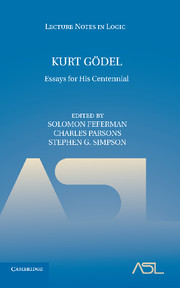The Gödel editorial project: A synopsis
Published online by Cambridge University Press: 04 August 2010
Summary
The final two volumes, numbers IV and V, of the Oxford University Press edition of the Collected Works of Kurt Gödel appeared in 2003, thus completing a project that started over twenty years earlier. What I mainly want to do here is trace, from the vantage point of my personal involvement, the at some times halting and at other times intense development of the Gödel editorial project from the first initiatives following Gödel's death in 1978 to its completion last year. It may be useful to scholars mounting similar editorial projects for other significant figures in our field to learn how and why various decisions were made and how the work was carried out, though of course much is particular to who and what we were dealing with.
My hope here is also to give the reader who is not already familiar with the Gödel Works a sense of what has been gained in the process, and to encourage dipping in according to interest. Given the absolute importance of Gödel for mathematical logic, students should also be pointed to these important source materials to experience first hand the exercise of his genius and the varied ways of his thought and to see how scholarly and critical studies help to expand their significance.
Though indeed much has been gained in our work there is still much that can and should be done; besides some indications below, for that the reader is referred to.
- Type
- Chapter
- Information
- Kurt GödelEssays for his Centennial, pp. 3 - 20Publisher: Cambridge University PressPrint publication year: 2010



